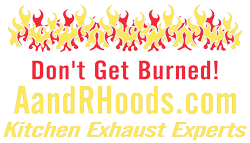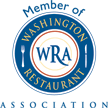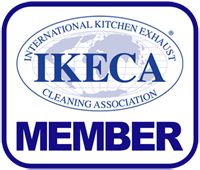Vent Hood Cleaning Western Washington • Preventing Grease Fires
With several thousand restaurant fires reported every year, it is estimated that 64% of them are believed to have started within the kitchen.
Improper vent hood cleaning is a leading cause of restaurant grease fires.
Grease fires are a result of grease buildup on vents, ducts and filters within your hood and exhaust system.
A and R Hood is certified and licensed to perform complete exhaust hood cleaning for commercial establishments in Western and Eastern Washington.
Vent hood cleaning is mandated by law; fire department, health department and insurance companies.
The National Fire Protection Association (NFPA) sets forth specific requirements (see #96 standard) for vent hood cleaning and hood and exhaust system maintenance.
It also specifically states that: “The responsibility for inspection, maintenance, and cleanliness of the ventilation control and fire protection of the commercial cooking operations shall be the ultimate responsibility of the owner…”
Grease is extremely flammable, and no matter what state (vapor, solid or liquid) it will ignite very easily, will burn rapidly and can spread to other areas within your kitchen.
The potential risk of grease fires are substantially reduced when exhaust hood cleaning is performed regularly.
Exhaust Hood Cleaning Western Washington • Hood and Exhaust System Cleaning
We have been in the exhaust hood cleaning industry for over 25 years, and take our hood and exhaust system cleaning services very seriously.
Our vent hood cleaning involves every part of the hood and exhaust system, including:
- Exhaust hood cleaning
- Ducts and fans
- Filters and back wall
- Vent hood cleaning and fan lubrication
- Belt inspection and replacement if necessary
- Hood polishing inside and out
Don’t be fooled by companies that perform exhaust hood cleaning on just what you can see.
A potential fire hazard exists in those areas that are not easily seen.
Our exhaust hood cleaning covers the entire system from top to bottom, not just what is visible.
Why choose us for vent hood cleaning to reduce risk of grease fires?
A grease fire will spread quickly.
The health and safety of your employees and customers is in your hands and we are here to help share that responsibility.
We are available 24/7 for scheduled maintenance, offer free hood and duct compliance inspections, and will address emergency issues for fire or health department violations.
Don’t delay…Call us for vent hood cleaning today!
The National Fire Protection Association regulations are specifically designed to limit the safety concerns and fire hazards associated with commercial cooking equipment and rooftop grease containment.
*7.8.2.1: The ability to drain grease out of any traps or low points formed in the fan or duct near the termination of the system into a collection container that is noncombustible, closed, rainproof, and structurally sound for the service to which it is applied and that will not sustain combustion.
11.6.2: Hoods, grease removal devices, fans, ducts, and other appurtenances shall be cleaned to remove combustible contaminants prior to surfaces becoming heavily contaminated with grease or oily sludge.
| Type or Volume of Cooking | Frequency |
|---|---|
| Systems serving solid fuel cooking operations | Monthly |
| Systems serving high-volume cooking operations such as 24-hour cooking, char broiling, or wok cooking | Quarterly |
| Systems serving moderate-volume cooking operations | Semi-Annually |
| Systems serving low-volume cooking operations such as churches, day camps, day camps, seasonal business or senior centers | Annually |
*8-3.1.1 Upon inspection, if found to be contaminated with deposits from grease-laden vapors, the entire exhaust system shall be cleaned by a properly trained, qualified, and certified company or person(s) acceptable to the authority having jurisdiction in accordance with Section 8-3.
*3-2.3 Grease filters shall be listed and constructed of steel or listed equivalent material and shall be of rigid construction that will not distort or crush under normal operation, handling, and cleaning conditions. Filters shall be tightfitting and firmly held in place.
*4-3.1 Openings shall be provided at the sides or at the top of the duct, whichever is more accessible, and at changes of direction. Openings shall be protected by approved access panels that comply with 4-3.4.4. Exception: Openings shall not be required in portions of the duct that are accessible from the duct entry or discharge.
*5-1.1 Approved upblast fans with motors surrounded by the airstream shall be hinged, supplied with flexible weatherproof electrical cable and service hold-open retainers, and listed for this use.
*6.2.3.1 Grease filters shall be listed and constructed of steel or listed equivalent material.
*6.2.3.2 Grease filters shall be rigid construction that will not distort or crush under normal operation, handling, and cleaning conditions.
*6.2.3.3 Grease filters shall be arranged so that all exhaust air passes through the grease filters.
*7.3.1 Openings shall be provided at the sides or at the top of the duct, whichever is more accessible, and at changes of direction.
*7.4.1.3 Openings on horizontal grease duct systems shall be provided with safe access and a work platform when not easily accessible from a 3 m (10 ft) stepladder.
*8.1.1.1 Approved upblast fans with motors surrounded by the airstream shall be hinged, supplied with flexible weatherproof electrical cable and service hold-open retainers, and listed for this use.
*8.1.5.3.1 Upblast fans shall be supplied with an access opening of a minimum 76 mm by 127 mm (3 in. by 5 in.) or a circular diameter of 101 mm (4 in.) on the curvature of the outer fan housing to allow for cleaning and inspection of the fan blades.
*11.6.10 When an access panel is removed, a service company label or tag preprinted with the name of the company and giving the date of inspection or cleaning shall be affixed near the affected access panels.
* Reproduced with permission from NFPA® 96: Standard for Ventilation Control and Fire Protection of Commercial Cooking Operations, Copyright© 2008, National Fire Protection Association.
This reprinted material is not the complete and official position of the NFPA on the referenced subject, which is represented only by the standard in its entirety.
News Grease Fire Videos





